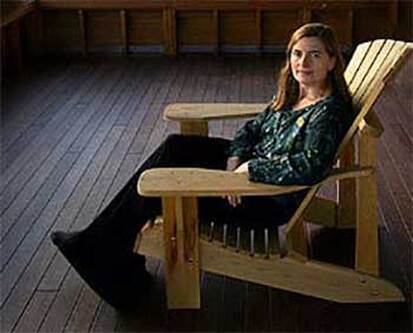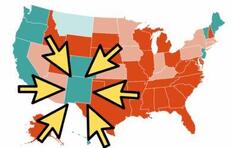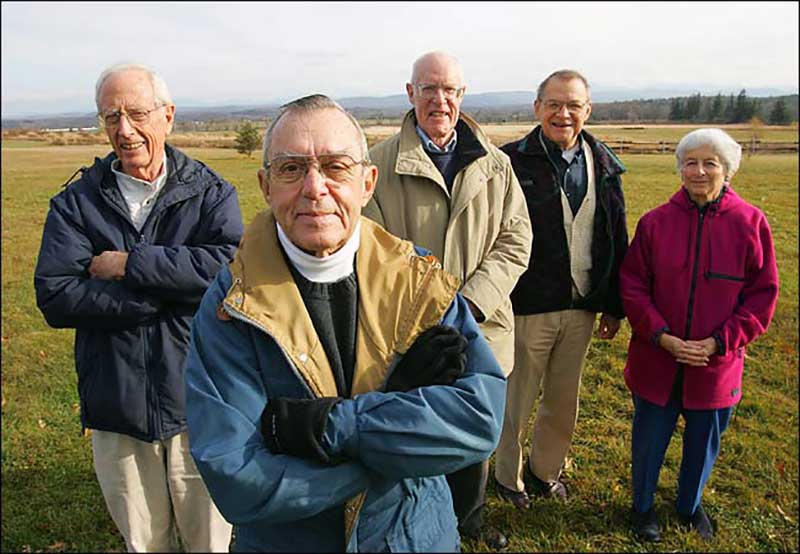 Who is the tough-looking team in this New York Times photo from 2005? Standing behind my father, Dick Walters, are Dick Austin, MD, Carmer Van Buren, MD, David Babbott, MD, and Ginny Walters, PhD (co-founder of PCV). As Ginny writes today (at age 96), “Having MDs who became active in the campaign in the beginning of PCV’s work was really meaningful. Dick Austin wrote really good letters to the editor citing his experience as a physician. He never minced words." The NY Times article quoted Dr. Austin as saying, "I've seen some of my friends here die rotten deaths." He cited the long periods of heavy sedation and misery for terminally ill patients and their families. Dr. Dick Austin died at the age of 99 this past week. The New York Times article also included a picture of Dr. Diana Barnard, who spoke passionately about the need for Act 39 in the early days of the campaign. Dr. Barnard continues to serve on PCV’s Board of Directors, as does Dr. Jaina Clough, both palliative care physicians in the UVM Health Network. We take this moment to honor these doctors. Throughout PCV’s history, both practicing and retired doctors served on our Board of Directors and Advisory Board, including Dr. Don Robinson, Dr. Charles Gluck, Dr. Stephanie Barnes, and until this past summer, Dr. Fred Crowley, a retired radiologist and past president of the Vermont Medical Society. Medical aid in dying is now widely available in Vermont. Dozens of physicians across the state have prescribed medical aid in dying under Act 39. Oncologists and neurologists, along with palliative care doctors, being the specialists who serve the majority of terminally ill patients who qualify under Act 39, have the most experience. At the same time, many physicians are just now being asked by patients about medical aid in dying for the first time. That is often why it takes several conversations for people who are interested in Act 39 to elicit a commitment from their physician to prescribe. Multiple discussions build trust in the relationship and confidence on the part of the doctor that the patient is making a well-considered and informed decision. The PCV team crafted our How to Talk to Your Doctor page to help guide you in these discussions. As we describe the persistence often needed, it’s not about being aggressive or demanding; it’s about helping your physician understand how important this option is to you. Requesting medical aid in dying requires planning. Start early. In recent conversations with patients on PCV’s hotline, we are seeing that many people wait until it is too late to navigate the medical and legal process of Act 39. People assume that it will be just like requesting any other medical treatment, not realizing that the law requires multiple steps with time in between, and that if their doctor is new to medical aid in dying, multiple meetings may be needed to help them come to the decision to support their choice. It is also the case that some people delay end-of-life discussions because they want to be focused on living and healing rather than dying. Paradoxically, having end-of-life conversations early can relieve a lot of uncertainty and help reduce fears and concerns. In this way, early conversations about dying are life-giving. We strongly encourage you to share this perspective with anyone who is living with a terminal disease. We are always here to listen and help patients and healthcare providers with Act 39 conversations. With warm regards, Betsy J. Walkerman, President
Many thanks to all of you who made contributions in response to Patient Choices Vermont's (PCV's) Spring Fundraising appeal. With this strong community behind us, we can continue to offer a wide range of educational services and work to streamline Act 39. If you missed our spring communications, you can always donate online or by mail. Patient Choices Vermont PO Box 671 Shelburne, VT 05482 ACT 39 UPDATE PROGRAMS FOR HOSPICE NURSESPatients and families who contact Patient Choices Vermont to learn more about medical-aid-in-dying almost always tell us how important and supportive their hospice nurses (and volunteers!) are. We deeply appreciate all of those who help provide hospice services. During discussions about end-of-life options including medical-aid-in-dying, Patient Choices Vermont always recommends the inclusion of hospice nurses as they are close to the patients, knowledgeable and compassionate, and able to serve as a trusted resource for discussions about end-of-life care and choices. To support their services and expertise, PCV has been making the rounds to Vermont’s hospice programs to offer an update about what’s happening with Act 39 in Vermont. Here’s what’s included in PCV's 2021 Hospice Training and Update Programs:
 If you would like to schedule an educational session for your hospice organization, contact Toni Kaeding MS RN. Toni Kaeding, MS RN, PCV Board Chair, is a nurse whose work has spanned clinical, academic, administrative, and policy positions in Vermont. She retired from the University of Vermont where she held both faculty and administrative appointments in the College of Nursing & Health Sciences. She was founding Director of the Freeman Scholars Program. In 2012, Toni was named recipient of the Founder’s Award by the Vermont Medical Society. She enjoys cross-country skiing and running and lives at the end of the road with her family in Worcester, Vermont. Toni handles the many calls PCV receives from patients and doctors. She helps educate students and community members. VOLUNTEER SPOTLIGHT: THE PEOPLE BEHIND THE PCV THANK-YOU NOTES, DATABASE, AND MOREPeople from all walks of life are drawn to volunteering with PCV, offering expertise, time and energy. Barbara Deal: If you have made a contribution to PCV in the past couple of years, you have received a thank-you card from Barbara Deal, a resident of Bristol, VT. Barbara was Director Addison County Hospice in the mid '90's and has a long-standing belief in encouraging people to say what they want the end of their lives to be like. She commented, "It has been an honor to serve PCV in this limited but sincere way. I have two dear friends who chose to use Act 39 and I am full of gratitude to PCV who made their choice possible." Ann Crocker: Many thanks to Barbara as she now passes this responsibility to Ann Crocker. As Ann says, "It is an honor for me to be able to contribute to Patient Choices Vermont by thanking our donors. Each donation supports the very important work of educating Vermonters so that people who terminally ill are aware of Act 39 and the choice that it offers." Nancy Hawley: Nancy is a business consultant specializing in business processes, systems, and information and accounting solutions. She has supported various aspects of PCV’s work since its founding in 2002. She recommended, configured and continues to maintain PCV’s supporter database. Her expertise in business data systems helps provide PCV with intelligent information for planning our fund-raising campaigns, and communicating effectively with donors. Thank you, Nancy! Jonathan Crocker: Jonathan helps fine-tune PCV’s communications, providing editing services and expertise in story-telling for PCV videos. He also tracks donations and keeps the supporter database accurate and up to date. Jonathan says, “I am humbled and inspired by the people whose stories I have encountered in this work; by both their courage and their generosity in sharing such deeply emotional journeys. Like them, I hope these stories help spread awareness of the value of medical-aid-in-dying, and can help others through the experience.” Congratulations New Mexico! New Mexico’s new medical-aid-in-dying law just went into effect. Named for Elizabeth Whitefield, a long-time Albuquerque family law judge and attorney who did not live long enough to testify on behalf of the bill in 2019, the new law brings the option of support for peaceful death to New Mexico residents. New Mexico is the tenth U.S. jurisdiction to enact a death with dignity law. |
Categories
All
Archives
July 2024
|
Proudly powered by Weebly





 RSS Feed
RSS Feed